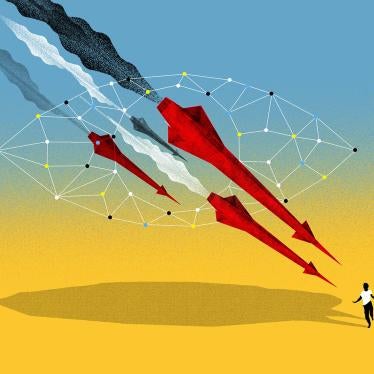Tech has been turned against human rights – or so it seemed from Edward Snowden’s revelations last year. The technological advances that enabled the Arab Spring and empowered citizen journalists were exposed as facilitating unfettered surveillance worldwide and outstripping legal protections.
We learned that Big Brother, a standby of totalitarian regimes, is also operating in Washington DC. The National Security Agency (NSA) was watching and gathering data from millions of people, with what many have viewed as inadequate congressional oversight, under overbroad authority approved by secretive courts. It turned out the agency overstepped even these feeble checks, as internal audits showed.
It’s clear that privacy laws passed before the Internet and mobile phones existed provide dubious protections in 2013. Governments have a duty to protect national security and prevent crime, but that doesn’t give them a pass to monitor the communications of millions of people who are under no suspicion. What price free speech when the Obama administration tries to get Snowden extradited for an alleged security breach that many see as legitimate whistleblowing?
The British government has said it has done nothing wrong and has yet to come clean on its surveillance practices and their impact on privacy. In the United States, the snowballing Snowden revelations eventually prompted a reformist outcry. There are many proposed legislative fixes. An Obama panel has recommended new limits on surveillance to better balance privacy and national security needs. A federal judge ruled the mass spying was likely to be deemed unconstitutional.
And at the United Nations, a General Assembly resolution stigmatized indiscriminate global surveillance as deeply harmful to human rights.
We documented the killing of many civilians by drones used in the targeted killing of alleged militants by U.S. forces; the Obama administration promised more limits on the program, but to unknown effect. And campaigners persuaded states around the world to consider a preemptive ban on “killer robots” to halt the development of “fully autonomous weapons” that would be able to choose and fire on targets without human intervention.
Of course there were many other, perhaps more obvious, human rights abuses around the world last year. In many cases, technology played a key role in exposing these atrocities, particularly in areas too remote or dangerous to reach in person. In Syria, activists on both sides of the vicious conflict rely on Skype, email and YouTube to disseminate data, whether videos of chemical weapon attacks or interviews bearing witness to other crimes.
Satellite imagery exposed the scale of destruction in Nigeria when soldiers burned down entire neighborhoods in a large town but claimed only 30 houses had been damaged, and also in Myanmar, when Muslims were repeatedly attacked and their neighborhoods razed in several areas. Amnesty International published images of North Korea’s prison camps. And Human Rights Watch, along with several expert bloggers, used satellite imagery, social media and other high-tech tools to verify data from Syria.
Twitter and Facebook have allowed activists and dissidents to mobilize in Saudi Arabia, one of the world’s most repressive countries. The #Women2Drive and YouTube video of Manal al-Sharif flouting the ban on women driving prompted worldwide support for reform in the Kingdom. A 2010 online campaign to free Samar Badawi, jailed by a Saudi judge on the charge of “parental disobedience,” garnered international media attention, prompting the authorities to release her.
In fact, women’s rights stories resonated strongly among Human Rights Watch followers online last year. The most re-tweets went to comment by our Egypt director, Heba Morayef, about a trial of young female demonstrators in Alexandria: “Madness is when prosecutors put 15 year-olds on trial for having participated in a peaceful demonstration Oct 31.” Videos on child sexual abuse in India and sexual violence against female protesters in Egypt topped our YouTube viewing list, while the jailing of the Russian feminist punk band Pussy Riot was most shared on Facebook.
Still, there are many human rights disasters that, because they take place in such remote locations, run the risk of being ignored.
One case in point is the Central African Republic, which has no reliable electricity, cell phone, and Internet connections, much less Twitter or Facebook users. The sound of one vehicle, a Human Rights Watch researcher reported, can terrify an entire village.
Mostly Muslim rebels in the Central African Republic seized power in a spring coup and launched brutal attacks on opponents, particularly presumed supporters of the deposed president. In retaliation, Christian villagers banded together in militias to avenge their losses. The human rights and humanitarian situation remains dire, with sectarian attacks on communities. But in recent weeks, through both traditional and electronic media, human rights activists and journalists have raised the alarm about the dangers facing desperate civilians and, in so doing, have prompted international action providing more troops, aid, and protection.
And of course some abuses are hidden in plain view. Even as Russia cracked down on dissent and legalized discrimination against LGBT people, it was touting the upcoming Winter Olympics in Sochi as a world-class event – and then stories emerged of local villagers allegedly bullied and shoved aside for the construction of Olympic sites and of the construction workers abused and denied their wages.
In the United States, it has taken thousands of voices, using social media but also old-fashioned vigils, fasts and acts of civil disobedience, to put immigration reform on the congressional agenda. House Republicans say it will be a priority in January and advocates are hoping the House will finally act to fix the broken immigration system to create a fair path to legalization that embraces family unity.
Perhaps 2014 will also be the (long overdue) year that the Senate ratifies the International Convention on the Rights of People with Disabilities, re-establishing U.S. leadership in the global effort to improve the human rights standards for this marginalized group.
Tech can help these efforts too. A big challenge for 2014 will be to utilize new tools and tactics for positive change – while reining in the efforts of those who are thinking just as hard about how to use tech to steal, spy or stifle dissent.








